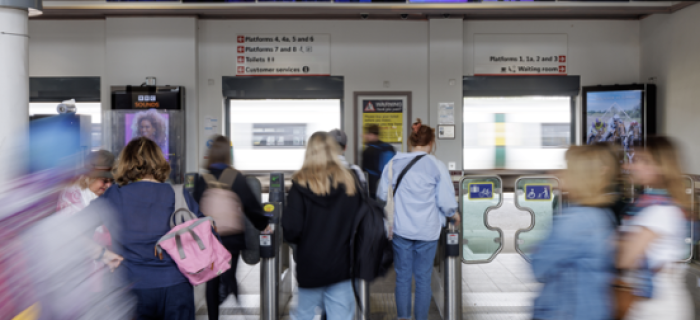New RIA report highlights the economic, environmental and social opportunities that rail delivers to the UK
A recent report commissioned by the Railway Industry Association, carried out by independent researchers at Oxford Economics, features two case studies from East West Rail and details the benefits to passengers, commuters, job seekers and the environment.
We’ve pulled out just a few key parts of the report below, but you can also read it in full here.
The UK’s rail network plays a central role in supporting the economy
The latest research builds on a report commissioned in September 2021 focussing on the economic contribution made by rail. That report showed that rail supports £43 billion GVA in economic growth, 710,000 jobs, and £14 billion in tax revenue. For every £1 spent on rail, £2.50 of income is generated in the wider economy.
Efficiently connecting people and places brings a range of additional benefits and helps to ease congestion elsewhere on the transport network. Moving people efficiently across the country, to and from cities and major transport hubs, contributes to economic growth. As well as the economic benefits from accessibility, those with better public transport links are more likely to have access to services and participate socially.
- £43 billion GVA in economic growth
- 710,000 jobs
- £14 billion in tax revenue
- 1.4%The UK rail sector's share of CO2e emissions
Reduced journey times can support additional jobs
Areas with accessible transport are associated with improved labour market outcomes. Being able to access economic centres and areas with employment is beneficial to people, while poor access to quality transport can pose a significant barrier to people finding and sustaining employment.
The report suggests that in the East of England, for example, there’d be an increase of nearly 10,000 jobs if journey times are reduced by 10%.
From creating jobs to cutting carbon emissions and improving health outcomes, the railway industry is perfectly positioned to support economic growth, help deliver on levelling up and accelerate the drive towards Net Zero.” – Darren Caplin, RIA Chief Executive.
Railway travel makes employment possible for people. It also facilitates access to education and skills development; sport, leisure, and culture; and family and friends—reducing social isolation. However, train services need to be frequent and reliable enough, and tickets affordable enough, for this to happen.
Shifting to increased use of rail networks reduces greenhouse gas emissions
A breadth of recent evidence highlights the environmental benefits supported by rail networks, and explains how a modal shift from other methods of transport supports reduced emissions.
Rail travel can also carry more people into major transport hubs and centres of economic activity using less land, reducing resource usage and environmental damage. Rail accounts for only 1.4% of the UK transport sector's CO2 emissions, but 9.5% of all passenger kilometres.
The report features a case study on East West Rail Alliance’s approach to biodiversity net gain, with some of the key outcomes being:
- No net loss of open river habitats, through the creation of river back waters and ponds, at a 1:22 ratio.
- Active avoidance of using best agricultural land for ecological mitigation, protecting food production and improving other ecosystem services such as flood resilience and air quality.
- Improved habitats for pollinators.
- Protection of public rights of way, providing wellbeing benefits to the local community.
- Waste reduction, including 99% of waste diverted from landfill and the reuse of excavated materials in the construction of new earthworks.
- Reducing the project’s carbon footprint wherever possible, by delivering materials to site by rail
Increased access to public transport supports improved social outcomes
Addressing social mobility is at the core of the UK Government’s Levelling Up strategy, which highlights the importance of investment into local transport projects (as one of three core investment themes) in supporting communities across the country.
The report features a case study focusing on how our colleagues at East West Rail Alliance are supporting social value.
Our relationship with local communities is a central part of the delivery strategy and our colleagues at East West Rail Alliance delivered over £1 million worth of social value to communities in the East West Rail corridor during the financial year 2021/22. Social value is embedded in the project through a set of key result areas. These include commitments around apprenticeships, graduate placements, community engagement events, betterment schemes and school activities. Key stakeholders and partners, including employees, supply chain partners, local residents and businesses were encouraged to submit ideas for community engagement projects.
This analysis should be valuable food for thought for the Government, leaving ministers in no doubt of the existing and potential economic, environmental and social benefits of the railways, and the need for ongoing investment in new and current infrastructure” – Lord Berkeley, Co-Chair of the All Party Parliamentary Group on Rail.
Source: Oxford Economics 2022 report commissioned by The Railway Industry Association titled The Economic, Environmental, and Social Opportunities that Rail Brings to the UK


